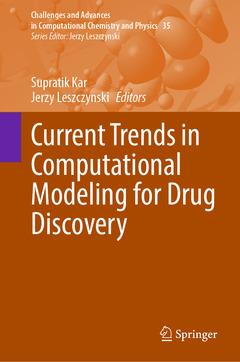Description
Current Trends in Computational Modeling for Drug Discovery, 1st ed. 2023
Challenges and Advances in Computational Chemistry and Physics Series, Vol. 35
Coordinators: Kar Supratik, Leszczynski Jerzy
Language: English
Subjects for Current Trends in Computational Modeling for Drug Discovery:
Publication date: 07-2023
301 p. · 15.5x23.5 cm · Hardback
301 p. · 15.5x23.5 cm · Hardback
Description
/li>Contents
/li>Biography
/li>Comment
/li>
This contributed volume offers a comprehensive discussion on how to design and discover pharmaceuticals using computational modeling techniques. The different chapters deal with the classical and most advanced techniques, theories, protocols, databases, and tools employed in computer-aided drug design (CADD) covering diverse therapeutic classes. Multiple components of Structure-Based Drug Discovery (SBDD) along with its workflow and associated challenges are presented while potential leads for Alzheimer?s disease (AD), antiviral agents, anti-human immunodeficiency virus (HIV) drugs, and leads for Severe Fever with Thrombocytopenia Syndrome Virus (SFTSV) disease are discussed in detail. Computational toxicological aspects in drug design and discovery, screening adverse effects, and existing or future in silico tools are highlighted, while a novel in silico tool, RASAR, which can be a major technique for small to big datasets when not much experimental data are present, is presented. The book also introduces the reader to the major drug databases covering drug molecules, chemicals, therapeutic targets, metabolomics, and peptides, which are great resources for drug discovery employing drug repurposing, high throughput, and virtual screening. This volume is a great tool for graduates, researchers, academics, and industrial scientists working in the fields of cheminformatics, bioinformatics, computational biology, and chemistry.
SBDD and its challenges.- In silico discovery of class IIb HDAC inhibitors: The state of art.- Role of computational modelling in drug discovery for Alzheimer’s disease.- Computational Modeling in the Development of Antiviral Agents.- Targeted computational approaches to identify potential inhibitors for Nipah virus.- Role of Computational Modelling in Drug Discovery for HIV.- Recent insight of the emerging severe fever with thrombocytopenia syndrome virus: drug discovery, therapeutic options, and limitations.- Computational toxicological aspects in drug design and discovery, screening adverse effects.- Read-Across and RASAR tools from the DTC Laboratory.- Databases for Drug Discovery and Development.
Dr. Supratik Kar, Tenure Track Assistant Professor in the Department of Chemistry at Kean University, Union, New Jersey, USA. Dr. Kar had listed in the "Top 2% Scientists in the World for singleyr_2020" considering all research fields published as per August 2021 data-update for "Updated science-wide author databases of standardized citation indicators". He has completed his B. Pharm. (2008) and M. Pharm. (2010) degrees from Jadavpur University, India securing the first position in both degrees and earned his Ph.D. (2015) from Jadavpur University, India. He is a former visiting researcher at the University of Gdańsk, Poland under a Marie-Curie research fellowship. Dr. Kar also worked as a post-doctoral research associate (2015-2022) at Jackson State University, Mississippi, USA. He has experience in computer aided drug design, molecular modeling and the field of medicinal chemistry for over thirteen years. He has published 86 (50+ Q1 and Q2 Journals) research and review articles in peer-reviewed journals, 23 book chapters, and co-authored two QSAR related books and Edited 1 book for Springer. Dr. Kar’s work has been cited 5600+ times according to Google Scholar with an h-index of 38. He serves as an associate editor for the Molecular Diversity (Springer), Frontiers in Pharmacology (Frontiers) and IJQSPR (IGI-Global). He is also serving as an Editorial Board member of the Journal of Clinical Medicine (MDPI), Current Drug Metabolism (Bentham), Pharmacogenomics Research and Personalized Medicine (AME) and IJANR (IGI-Global). He is also reviewer board member for Polymers (MDPI) and Informatics and Computational Methods [Frontiers in Natural Products] (Frontiers). Dr. Kar worked as a reviewer and an editor for 70+ reputed peer-reviewed journals.
Dr. Jerzy Leszczynski, Professor of Chemistry and President’s Distinguished Fellow at the Jackson State University (JSU). Prof. Leszczynski attended the Technical Univ
Discusses fundamental tools, algorithms and methods of computational modeling
Presents applications of molecular modeling to drug design
Features contributions from leading experts in the field
© 2024 LAVOISIER S.A.S.
These books may interest you

Computer-Aided Drug Discovery 105.49 €

Computer-Aided Drug Discovery 147.69 €


